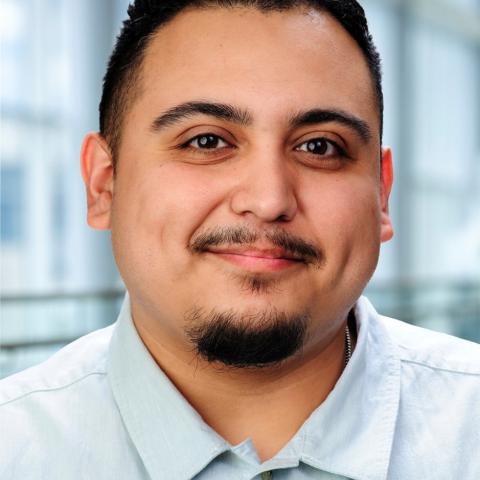Principal Investigator

Amol Patwardhan, M.D., Ph.D.
Amol was raised in India and completed his medical training there. He received a Ph.D. in pharmacology under the mentorship of Dr. Kenneth Hargreaves at UTHSCSA. He went on to complete an anesthesia residency and interventional pain fellowship at University of Arizona and UCSD respectively. Over the years his work has focused on mechanisms of opioid and cannabinoid analgesia, endogenous lipid activators of pain, neurotensin receptor pharmacology and interventional trial of pharmacological and nonpharmacological approaches in pain patients.
Postdoctoral Researcher

Zaid Abbasi, Ph.D.
Born in the storied city of Samarra, nestled in the heart of Mesopotamia, Iraq, Zaid Al-Abbasi’s journey is one of resilience, purpose, and unwavering dedication to science. He spent his formative years in Samarra, where he completed his high school education and earned a bachelor’s degree in chemistry from the University of Samarra. His early fascination with the molecular world led him to pursue a master’s degree in Biochemistry at the University of Tikrit, graduating with honors in 2014.It was during this time that Zaid began his first independent research under the mentorship of Dr. Ferah Al-Salihi—a guiding figure who became both a scientific inspiration and a lifelong friend. These formative experiences in the lab sparked a profound commitment to scientific inquiry and discovery. However, Zaid’s academic path was soon disrupted by the outbreak of civil war. Forced to leave his homeland, he sought refuge in Turkey, where he found new purpose as a high school teacher at an International School. There, he dedicated himself to nurturing young minds, instilling in his students the same curiosity and hope that had carried him through adversity. Determined to continue his journey in biomedical research, Zaid relocated to the United States and joined the Graduate School of Biomedical Science and Engineering (GSBSE) at the University of Maine. He found a new academic home in the welcoming laboratory of Dr. Derek Molliver at the University of New England, where he continued to explore the frontiers of biomedical science. In 2025, Zaid earned his Ph.D. in Biomedical Science from the University of Maine. His path—from the war-torn streets of Iraq to the cutting edge of scientific research—is a powerful testament to the human spirit. It reflects not only a deep passion for science but also an enduring belief in the transformative power of education, perseverance, and hope.

Seph Palomino, Ph.D.
Seph Palomino is from Tucson, Arizona. He received his Ph.D. in Medical Pharmacology from the College of Medicine at the University of Arizona in 2022. His thesis focus was on how inhibition of Heat Shock Protein 90 mitigated facial allodynia and improved blood brain barrier Integrity in a migraine model utilizing cortical spreading depression. Currently, He is working with Dr. Patwardhan investigating the neurotensin receptor system as a potential analgesic pathway for drug development as an opioid alternative for post-surgical and neuropathic pain.
Research Technician

Ricardo Rayas
Ricardo joins the Anesthesiology and Pain Management Department as a Research Associate working with Patwardhan Laboratory. He is a Dallas native and UT Austin graduate, he has experience in cancer biology, imaging, and drug therapies. He previously worked in the Mason and Liu Labs, supporting research with animal models and molecular techniques. Outside of science, Ricardo enjoys music and plays the trumpet.

Sanjay Shori
Sanjay Shori is a senior Honors Neuroscience major at The University of Texas at Dallas. His previous research experience includes working on vagus nerve stimulation at the Thorn Lab and data collection for chronic liver disease medication at Baylor Scott & White Research Institute. Sanjay is most interested in studying neuropharmacology and uncovering the hidden mechanisms behind drug delivery. He is working with Dr. Patwardhan at UT Southwestern investigating drug development as an opioid alternative for post-surgical and neuropathic pain.
Our Research
A major focus of the Patwardhan lab is translational research into mechanisms of pain and potential treatment. Specific projects include:
- Advancement of an evolutionary conserved mechanism of non-opioid analgesia into humans with high impact chronic pain such as cancer and neuropathic pain
- Identification of biological factors associated with neuropathic pain
- Clinical trials of non-opioid pharmacological agents as well as neuromodulatory devices in chronic pain patients
The approaches employed include in-vivo behavioral assays in various high impact chronic states, biochemical, imaging and genetic editing techniques in animals. Moreover, we also use human donor tissue such as sensory neurons and spinal cord to translate these findings to humans using novel biochemical and genetic techniques. Clinical studies involve longitudinal assessment of various interventions in chronic pain patients.
As research techniques have become highly specialized over the years, it is ever more important to work in collaborative team models where investigators with different expertise come together to take on complex problems such as chronic pain. Our laboratory firmly believes in a ‘team science’ approach and has numerous local, national and international collaborations to investigate chronic pain mechanisms and therapies.
Journals
Price TJ, Patwardhan AM, Akopian AN, Hargreaves KM, Flores CM; Modulation of trigeminal sensory neuron activity by the dual cannabinoid-vanilloid agonists anandamide, N-arachidonoyldopamine and arachidonyl-2-chloroethylamide. British Journal of Pharmacology 2004; 141(7):1118-30. PMID: 15006899. PMCID: PMC1574881. DOI: 10.1038/sj.bjp.0705711.
Price TJ, Patwardhan AM, Akopian AN, Hargreaves KM, Flores CM; Cannabinoid receptor-independent actions of the aminoalkylindole cannabinoid WIN 55,212-2 on trigeminal sensory neurons. British Journal of Pharmacology 2004;142(2):257-266. PMID 15155534. DOI: 10.1038/sj.bjp.0705778.
Price TJ, Louria MD, Candelario-Soto D, Dussor GO, Jeske NA, Patwardhan AM, Diogenes A, Trott AA, Hargreaves KM, Flores CM; Treatment of trigeminal ganglion neurons in vitro with NGF, GDNF or BDNF: effects on neuronal survival, neurochemical properties and TRPV1-mediated neuropeptide secretion. BioMed Central Neuroscience 2005; Jan 24;6(1):4. PMID: 15667652.
Price TJ, Patwardhan AM, Flores CM, Hargreaves KM; A role for anandamide membrane transporter in TRPV1-mediated neurosecretion from trigeminal sensory neurons. Neuropharmacology2005 Jul;49(1):25-39. PMCID: PMC1892309. NIHMSID: NIHMS21435. DOI: 10.1016/j.neuropharm.2005.01.031.
Patwardhan AM, Berg KA, Akopian AN, Jeske NA, Gamper N, Clarke WP, Hargreaves KM; Bradykinin induced functional competence and trafficking of the Delta opioid receptor in trigeminal nociceptors. Journal of Neuroscience 2005; Sep 28;25(39):8825-8832. PMID: 16192372.
Diogenes A, Patwardhan AM, Jeske NA, Ruparel NB, Goffin V, Akopian AN, Hargreaves KM; Prolactin Modulates TRPV1 in Female Rat Trigeminal Sensory Neurons. Journal of Neuroscience 2006; Aug 2;26(31):8126-8136. DOI: https://doi.org/10.1523/JNEUROSCI.0793-06.2006.
Jeske NA, Patwardhan AM, Gamper N, Price TJ, Akopian AN, Hargreaves KM.; Cannabinoid WIN 55,212 regulates TRPV1 phosphorylation in sensory neurons. Journal of Biological Chemistry 2006; Oct 27;281(43):32879-32890. Epub 2006 Sep 5. PMCID: PMC2910918. DOI: 10.1074/jbc.M603220200.
Patwardhan AM, Diogenes A, Akopian AN, Berg KA, Clarke WP, Hargreaves KM; PAR-2 agonists activate trigeminal nociceptors and induce functional competence in the Delta opioid receptor. Pain 2006; Nov125(1-2):114-124. Epub 2006 Jun 14. PMID: 16781076. DOI: 10.1016/j.pain.2006.05.007.
Patwardhan AM, Jeske NA, Price TJ, Gamper N, Akopian AN, Hargreaves KM; The Cannabinoid WIN 55,212 inhibits TRPV1 and evokes peripheral antihyperalgesia/antinociception via the calcineurin pathway. Proceedings of National Academy of Sciences of the United States of America 2006; 103(30):11393-11398. Epub 2007 Mar 8. PMID: 16849427. DOI: 10.1073/pnas.0603861103.
Berg KA, Patwardhan AM, Sanchez TA, Silva YM, Hargreaves KM, Clarke WP; Rapid modulation of micro-opioid receptor signaling in primary sensory neurons. Journal of Pharmacology and Experimental Therapeutics 2007; 321(3):839-847. DOI: https://doi.org/10.1124/jpet.106.116681.
Ruparel NB, Patwardhan AM, Akopian AN, Hargreaves KM; Homologous and heterologous desensitization of capsaicin and mustard oil responses utilize different cellular pathways in nociceptors. Pain 2008; 135(3):271-279;. PMCID: PMC2322862. DOI: 10.1016/j.pain.2007.06.005.
Akopian AN, Ruparel NB, Patwardhan AM, Hargreaves KM; Cannabinoids desensitize capsaicin and mustard oil responses in sensory neurons via TRPA1 activation. Journal of Neuroscience 2008; Jan 30:28(5):1064-1075. DOI: 10.1523/jneurosci.1565-06.2008.
Patwardhan AM, Vela J, Farugia J, Cerka K, Hargreaves KM; Trigeminal nociceptors express prostaglandin receptors. Journal of Dental Research 2008; Mar 87(3):262-266. PMID: 18296611. DOI: 10.1177/154405910808700306.
Akopian AN, Ruparel NB, Jeske NA, Patwardhan AM, Hargreaves KM; Role of ionotropic cannabinoid receptors in peripheral antinociception and antihyperalgesia. Trends in Pharmacological Science 2009; Feb 30(2):79-84. PMID: 19070372. PMCID: PMC2863326. DOI: 10.1016/j.tips.2008.10.008.
Jeske NA, Patwardhan AM, Henry MA, Milam SB; Fibronectin stimulates TRPV1 translocation in primary sensory neurons. Journal of Neurochemistry 2009; Feb;108(3):591-600. Epub 2008 Nov 11. PMCID: PMC: 2678239. DOI: 10.1111/j.1471-4159.2008.05779.x.
Rowan MP, Ruparel NB, Patwardhan AM, Berg KA, Clarke WP. Hargreaves KM; Peripheral Delta Opioid Receptors (DOR) Require Priming for Functional Competence In Vivo. European Journal of Pharmacology 2009; 602(2-3):283-287. Epub 2008 Nov 25. PMCID: PMC2635024. DOI: 10.1016/j.ejpharm.2008.11.028.
Jeske NA, Patwardhan AM, Ruparel NB, Akopian AN, Shapiro MS, Henry MA; A-kinase anchoring protein 150 controls protein kinase C-mediated phosphorylation and sensitization of TRPV1. Pain 2009. Dec; 146(3):301-307. Sep 18. Epub ahead of print. PMCID: PMC2783249. DOI: 10.1016/j.pain.2009.08.002.
Patwardhan AM, Scotland PE, Akopian AN, Hargreaves KM; Activation of TRPV1 in the spinal cord by oxidized linoleic acid metabolites contributes to inflammatory hyperalgesia. Proceedings of the National Academy of Science United States of America 2009 Nov 3;106(44):18820-18824. Epub 2009 Oct 20. PMCID: PMC2764734. DOI: 10.1073/pnas.0905415106.
Patwardhan AM, Akopian AN, Ruparel NB, Diogenes A, Weintraub ST, Uhlson C, Murphy RC, Hargreaves KM; Heat generates oxidized linoleic acid metabolites that activate TRPV1 and produce pain in rodents. Journal of Clinical Investigation 2010 May 3;120(5):1617-1626. Epub 2010 Apr 26. PMCID: PMC2860941. DOI: 10.1172/JCI41678.
Ruparel NB, Patwardhan AM, Akopian AN, Hargreaves KM; Desensitization of TRPA1 by the TRPV1-selective cannabinoid arachidonoly-2 chloroethanolamine (ACEA). Molecular Pharmacology 2011 Jul:80(1):117-123. PMCID: PMC3127531. DOI: 10.1124/mol.110.068940.
Berg KA, Rowan MP, Sanchez TA, Silva M, Patwardhan AM, Milam SB, Clarke WP; Regulation of k-opioid receptor signaling in peripheral sensory neurons in vitro and in vivo. Journal of Pharmacology and Experimental Therapeutics 2011. Jul 338(1):92-99. PMCID: PMC3126642. DOI: 110.1124/jpet.110.177493.
Patil M, Patwardhan AM, Hargreaves KM, Akopian AN; Cannabinoid receptor antagonists activate TRPA1 in sensory neurons. Neuropharmacology 2011 Sep; 61(4):778-788. Epub 2011 May 27. PMID: 21645591. PMCID: PMC3130079. DOI: 10.1016/j.neuropharm.2011.05.024
Trevino EG, Patwardhan AM, Henry MA, Perry G, Dybdal-Hargreaves N, Hargreaves KM, Diogenes A; Effect of Irrigants on the Survival of Human Stem Cells of the Apical Papilla in a Platelet-rich Plasma Scaffold in Human Root Tips. Journal of Endodontics 2011; Aug;37(8):1109-1115. PMID: 21763903. DOI: 10.1016/j.joen.2011.05.013.
Bowden K, Wuollet A, Patwardhan AM, Price TJ, Lawall J, Annabi J, Barker S, Annabi E; Transforaminal blood patch for the treatment of chronic headache from intracranial hypotension: a case report and review. Anesthesiology Research and Practice 2012:923904. Epub 2011 Jul 18. PMCID: PMC3139890. DOI: 10.1155/2012/923904.
Berg K, Patwardhan AM, Akopian AN; Receptor and Channel Heteromers as Pain Targets. Pharmaceuticals 2012 Mar;5(3);249-278. Epub 2012 Feb 23. PMCID: PMC3763638. DOI: 10.3390/ph50302498.
Stidd DA, Wuollet AL, Bowden K, Price T, Patwardhan AM, Barker S, Weinand ME, Annabi J, Annabi E; Peripheral nerve stimulation for trigeminal neuropathic pain. Pain Physician 2012; Jan-Feb;15(1):27-33. PMID: 22270735. PMCID: PMC4664452.
Patwardhan AM, Eldemayer R, Annabi E, Price TJ, Malan TP, Dussor GO; Receptor specificity defines algogenecity of propofol and fospropofol. Anesthesia and Analgesia 2012 Oct;115(4):837-840. Epub 2012 May 14. PMCID: PMC3433588. NIHMSID: NIHMS375465. DOI: 10.1213/ANE.0b013e318258b9db.
Taylor A, Westveld AH, Szkudlinska M, Guruguri P, Annabi E, Patwardhan AM, Price TJ, Yassine HN; The use of metformin is associated with decreased lumbar radiculopathy pain. Journal of Pain Research 2013; Dec 9;6:755-763. PMID: 24357937. PMCID: PMC3862700. DOI: 10.2147/JPR.S52205.
Xie JY, Qu C, Patwardhan A, Ossipov MH, Navratilova E, Becerra L, Borsook D, Porreca F; Activation of mesocorticolimbic reward circuits for assessment of relief of ongoing pain: A potential biomarker of efficacy. Pain 2014; Aug 155(8):1659-1666. PMID: 24861580. PMCID: PMC4118589. DOI: 10.1016/j.pain.2014.05.018.
Sirianni J, Ibrahim MM, Patwardhan AM; Chronic pain syndromes, mechanisms, and current treatments. Progress in Molecular Biology Translational Science 2015;131:565-611. Epub 2015 Feb 9. PMID: 25744686. DOI: 10.1016/bs.pmbts.2015.01.004
Moutal A, Chew LA, Yang X, Wang Y, Yeon SK, Telemi E, Meroueh S, Park KD, Shrinivasan R, Gilbraith KB, Qu C, Xie JY, Patwardhan A, Vanderah TW, Khanna M, Porreca F, Khanna R; (S)-lacosamide inhibition of CRMP2 phosphorylation reduces postoperative and neuropathic pain behaviors through distinct classes of sensory neurons identified by constellation pharmacology. Pain 2016 Jul;157(7):1448-1463. PMID: 26967696. PMCID: PMC4936788. DOI: 10.1097/j.pain.000000000000555.
Matika R., Ibrahim MM, Patwardhan AM; The importance of body temperature: An anesthesiologist's perspective. Temperature 2017; 4(1):9-12.Epub 07 Oct 2016.
Ibrahim MM*, Patwardhan AM*, Gilbraith K, Moutal A, Yang X, Chew L, Largent-Mines T, Malan TP, Vanderah TW, Porreca F, Khanna R; Long-lasting Antinociceptive Effects of Green Light in Acute and Chronic Pain in Rats. Pain 2017; 158(2):347-360 (*= Equal contribution). PubMed: 28092651. PMC: PMC5242385. DOI: 10.1097/j.pain.000000000000767
Garami A, Ibrahim M, Gilbraith K, Khanna, R, Pakai E, Miko A, Pinter E, Romanovsky AA, Porreca F, Patwardhan AM; “TRPV1 Antagonists Prevent Anesthesia-induced Hypothermia and Decrease Post-incisional Opioid Dose Requirements in Rodents.” Anesthesiology, 2017; Nov;127(5):813-823. Doi: 10.1097/SLN.000000000001812.
Patwardhan AM, Porreca F, Schmidt W, Romanovsky AA. “The opioid crisis and …. Reconsidering the use of drugs that affect body temperature.” Temperature, 2018. DOI: 10.1080/23328940.2018.1437312. Published online: 06 Mar 2018.
Garami A, Ibrahim M, Gilbraith K, Khanna R, Pakai E, Miko A, Pinter E, Romanovsky AA, Porreca F, Patwardhan AM. ‘In reply to comment by Wu et al.’ Anesthesiology, 2018 Aug;129(2):378-379. doi: 10.1097/ALN.0000000000002294.
Patwardhan A.M., Matika R., Gordon J., Singer B., Salloum M., and Ibrahim M.M. (2018) “Exploring The Role of Chronic Pain Clinics: Potential for Opioid Reduction” Pain Physician Nov;21(6):E603-E610
Navaratilova E., Patwardhan A.M., Porreca F. (2019) “Opioid analgesics pass the acid test” The Lancet Apr 20;393(10181):1579-1581
Goel V, Patwardhan AM, Ibrahim M, Howe CL, Schultz DM, Shankar H (2019) “Complications associated with stellate ganglion nerve block: a systematic review.” Reg Anesth Pain Med. 2019 Apr 16
Khanna R, Yu J, Yang X, Moutal A, Chefdeville A, Gokhale V, Shuja Z, Chew LA, Bellampalli SS, Luo S, François-Moutal L, Serafini MJ, Ha T, Perez-Miller S, Park KD, Patwardhan AM, Streicher JM, Colecraft HM, Khanna M (2019) “Targeting the CaVα-CaVβ interaction yields an antagonist of the N-type CaV2.2 channel with broad antinociceptive efficacy.” Pain 2019 Feb 5. doi: 10.1097/j.pain.0000000000001524
Khanna R., Patwardhan A.M., Gilbraith K.B., Yang X, Li W., Cai S., Ji Y., Chew L., Dorame A., Bellampalli S., Schmoll R., Gordon, J., Moutal M., Malan TP, Vanderah T., Porreca F. and Ibrahim MM (2019) “Development and Characterization of An Injury-free Female Predominant Model of Diffuse Muscular Pain in Rats: Relevance to Fibromyalgia-like Syndrome” J Pain 2019 May 2. pii: S1526-5900(18)30814-9
Goel V, Patwardhan AM, Ibrahim M, Shankar H, Schultz DM (2019) “Indented intrathecal drug delivery system with loss of reservoir volume” Reg Anesth Pain Med. 2019 May 12
Kopruszinski CM, Navratilova E, Vagnerova B, Swiokla J, Patwardhan A, Dodick D, Porreca F (2019) “Cannabinoids induce latent sensitization in a preclinical model of medication overuse headache” Cephalalgia. 2019 Jul 16:
Chen Y, Moutal A, Navratilova E, Kopruszinski C, Yue X, Ikegami M, Chow M, Kanazawa I, Bellampalli SS, Xie J, Patwardhan A, Rice K, Fields H, Akopian A, Neugebauer V, Dodick D, Khanna R, Porreca F (2020) “The prolactin receptor long isoform regulates nociceptor sensitization and opioid-induced hyperalgesia selectively in females.” Sci Transl Med. 2020 Feb 5;12(529):eaay7550. doi: 10.1126/scitranslmed.aay7550.
Moutal A, Martin LF, Boinon L, Gomez K, Ran D, Zhou Y, Stratton HJ, Cai S, Luo S, Gonzalez KB, Perez-Miller S, Patwardhan A, Ibrahim MM, Khanna R (2020) “SARS-CoV-2 Spike protein co-opts VEGF-A/Neuropilin-1 receptor signaling to induce analgesia.”Pain. 2020 Oct 1. doi:10.1097/j.pain.0000000000002097.
Martin LF, Patwardhan AM, Jain SV, Salloum MM, Freeman J, Khanna R, Gannala P, Goel V, Jones-MacFarland FN, Killgore WD, Porreca F, Ibrahim MM (2020) “Evaluation of green light exposure on headache frequency and quality of life in migraine patients: A preliminary one-way cross-over clinical trial”
Cephalalgia. 2020 Sep 9:333102420956711. doi: 10.1177/0333102420956711
Goel V, Kumar V, Agrawal SN, Patwardhan AM, Ibrahim M, DeSimone DC, Sivanesan E, Banik RK, Shankar H. (2020) “Outcomes Associated With Infection of Chronic Pain Spinal Implantable Electronic Devices: Insights From a Nationwide Inpatient Sample Study” Neuromodulation 2020 Sep 14. doi: 10.1111/ner.13263. Online ahead of print.
Martin L, Porreca F, Mata EI, Salloum M, Goel V, Gunnala P, Killgore WDS, Jain S, Jones-MacFarland FN, Khanna R, Patwardhan A, Ibrahim MM (2020) “Green Light Exposure Improves Pain and Quality of Life in Fibromyalgia Patients: A Preliminary One-Way Crossover Clinical Trial.” Pain Med. 2020 Nov 6:pnaa329. doi: 10.1093/pm/pnaa329
Goel V, Yang Y, Kanwar S, Banik RK, Patwardhan AM, Ibrahim M, Sivanesan E, Shankar H (2020). “Adverse Events and Complications Associated With Intrathecal Drug Delivery Systems: Insights From the Manufacturer and User Facility Device Experience (MAUDE) Database” Neuromodulation. 2020 Dec 11. doi: 10.1111/ner.13325
Goel V, Moran B, Kaizer AM, Sivanesan E, Patwardhan AM, Ibrahim M, DeWeerth JC, Shannon C 4th, Shankar H (2021) “Opioid Prescriptions by Pain Medicine Physicians in the Medicare Part D Program: A Cross-Sectional Study” Anesth Analg. 2021 Jun 1;132(6):1748-1755. doi: 10.1213/ANE.0000000000005399.
Cheng K, Martin LF, Slepian MJ, Patwardhan AM, Ibrahim MM. (2021) “Mechanisms and Pathways of Pain Photobiomodulation: A Narrative Review.” J Pain. 2021 Feb 23:S1526-5900(21)00025-0. doi: 10.1016/j.jpain.2021.02.005.
Goel V, Patwardhan AM, Ibrahim M, Yang Y, Sivanesan E, Banik RK, Shannon C, Shankar H. (2021) “Industry Payments to Pain Medicine Physicians: An Analysis of the Centers for Medicare and Medicaid Services Open Payments Program” Pain Med 2021 Jun 4;22(6):1376-1386. doi: 10.1093/pm/pnaa450.
Martin LF, Moutal A, Cheng K, Washington SM, Calligaro H, Goel V, Kranz T, Largent-Milnes TM, Khanna R, Patwardhan A, Ibrahim MM. (2021) “Green light antinociceptive and reversal of thermal and mechanical hypersensitivity effects rely on endogenous opioid system stimulation” J Pain
2021 Jun 19;S1526-5900(21)00243-1. doi: 10.1016/j.jpain.2021.05.006
Goel V, Kumar V, Patwardhan AM, Ibrahim M, Sivanesan E, Darrow D, Shankar H.(2021) “Procedure-Related Outcomes Including Readmission Following Spinal Cord Stimulator Implant Procedures: A Retrospective Cohort Study” Anesth Analg. 2021 Dec 15. doi: 10.1213/ANE.0000000000005816.
Ikegami D, Navratilova E, Yue X, Moutal A, Kopruszinski CM, Khanna R, Patwardhan A, Dodick DW, Porreca F (2021) “A prolactin-dependent sexually dimorphic mechanism of migraine chronification” Cephalalgia. 2021 Sep 12:3331024211039813. doi: 10.1177/03331024211039813
Martin LF, Ibrahim MM, Yu J, Cai S, Gomez K, Chew L, Bellampalli S, Moutal A, Largent-Milnes T., Porreca F, Khanna R, Olivera B and Patwardhan AM (2021). “Conotoxin Congulakin-G engages a neurotensin receptor 2 (NTSR2)/R-type calcium channel (Cav2.3) pathway to mediate spinal antinociception” Pain Dec 15.doi: 10.1097/j.pain.0000000000002561
Goel V, Kaizer A, Patwardhan AM, Ibrahim M, DeSimone DC, Sivanesan E, Shankar H (2021)“
Postoperative Oral Antibiotic Use and Infection-Related Complications After Spinal Cord Stimulator Surgery” Neuromodulation. 2021 Dec 18:S1094-7159
Ramiro I., Bjørn-Yoshimoto W., Imperial J., Gajewiak J., Watkins M., Taylor D., Resager W., Ueberheide B., Brauner-Osbrone H., Whitby F., Hill C., Martin L., Patwardhan A., Concepcion G., Olivera BM, Safavi-Hemami H. (2022) “Somatostatin venom analogs evolved by fish-hunting cone snails: from prey capture behavior to identifying drug leads” Science Advances 2022 Mar 25;8(12)
Ito H, Navratilova E, Vagnerova B, Watanabe M, Kopruszinski C, Moreira de Souza LH, Yue X, Ikegami D, Moutal A, Patwardhan A, Khanna R, Yamazaki M, Guerrero M, Rosen H, Roberts E, Neugebauer V, Dodick DW, Porreca F. (2022) “Chronic pain recruits hypothalamic dynorphin/kappa opioid receptor signalling to promote wakefulness and vigilance” Brain. 2022 Apr 29
Book Chapters
Martins Y. AlMuslim M and Patwardhan AM “Pain—Acute Versus Chronic Pain & Anesthesia” Comprehensive Pharmacology (edited by Terry Kenakin)
Poster Publications
Patwardhan AM, Price T J, Trott A A, Hargreaves KM, Flores CM; Cannabinoid agonist modulation of CGRP release from primary sensory neurons of rat trigeminal ganglia. Society of Neuroscience Abstract 453.1. November 2002
Patwardhan AM, Akopian AN, Trott AA, Clarke WP, Berg KA, Hargreaves KM; Delta opioid agonist modulation of CGRP release from rat trigeminal ganglia: effect of bradykinin preconditioning. Society of Neuroscience Abstract 588.7 November 2003
Patwardhan AM, Berg KA, Jeske NA, Sanchez TA, Clarke WP, Hargreaves KM; Effect of bradykinin pre-conditioning on trafficking and function of opioid receptors in trigeminal sensory neurons. Society of Neuroscience Abstract November 2004
Berg KA, Sanchez TA, Patwardhan AM, Hargreaves KM, Clarke WP; Mechanisms of bradykinin-mediated regulation of mu opioid receptor responsiveness in cultured trigeminal ganglia neurons. Society of Neuroscience. Abstract November 2004
Scalzitti J, Berg KA, Jeske NA, Patwardhan AM, Zardeneta G, Hargreaves KM, Clarke WP, Roberts JL; Endopeptidases 24.15 and 24.16 in Opioid Receptor Signaling in the Trigeminal Sensory Ganglion. Society of Neuroscience. Abstract November 2004
Vela J, Patwardhan AM, Gould G, Cerecero J, Hargreaves KM; Adrenergic Modulation of Trigeminal Nociceptors. Society of Neuroscience Abstract November 2004
Bains M, Jeske NA, Helesic G, Berg K, Patwardhan AM, Chung WCJ, Handa RJ, Clarke WP, Hargreaves KM, Roberts JL; SEX AND PAIN: OUCH, THAT HURT. Society of Neuroscience Abstract 746.16 November 2004
Patel T, Tonioli M, Patwardhan A M, Diogenes A, Naftel J, Keiser K , Hargreaves K M; Characterization of Bradykinin Receptor-Expressing neurons in rat trigeminal ganglia. AAE Abstract October 2004
Tonioli M, Patel T, Diogenes A, Patwardhan A M, Keiser K, Hargreaves K M; Effect of neurotrophic factors on bradykinin receptor expression in rat trigeminal sensory neurons determined by Real Time Polymerase Chain Reaction (RT-PCR). AAE Abstract October 2004
Patwardhan AM, Akopian AN, Jekse NA, Hargreaves KM; Involvement of the calcium-calcineurin pathway in peripheral cannabinoid-induced antihyperalgesia/antinociception. Society of Neuroscience Abstract 622.2 July 2005
Ruparel NB, Akopian AN, Patwardhan AM, Jeske NA, Hargreaves KM; Cannabinoids inhibit capsaicin-sensitive neurons via heterologous densensitization mediated by the TRPV1-TRPA1 heteromultimer. Society of Neuroscience. Abstract 622.3 July 2005
Jeske NA, Patwardhan AM, Akopian AN, Hargreaves KM; Cannabinoids reduce phosphorylation of TRPV1 via a calcineurin dependent mechanism. Society of Neuroscience Abstract 622.1 July 2005
Berg KA, Patwardhan AM, Zardaneta G, Hargreaves KM, Milam S, Clarke WP; Regulation of K-opioid receptors in cultured trigeminal ganglion neurons. Society of Neuroscience Abstract 511.2 July 2005
Pham MK, Zardeneta, G, Patwardhan AM, De la Feunte J, Milam SB; Mechanical Stimulation via Integrins Causes CGRP Secretion in Neuronal Cultures. AADR Abstract July 2005
Vela J, Patwardhan AM, Gould G, Cerecero J, Hargreaves KM; Adrenergic Modulation of Trigeminal Nociceptors. AADR Abstract July 2005
Patwardhan AM, Akopian AN, Jeske NA, Hargreaves KM; Involvement of the calcium-calcineurin pathway in peripheral cannabinoid-induced antihyperalgesia/antinociception. American Pain Society Abstract 5828 May 2006
Ruparel NB, Akopian AN, Patwardhan AM, Jeske NA, Hargreaves KM; Cannabinoids inhibit capsaicin sensitive neurons via a heterologous desensitization mediated by the TRPV1/TRPA1 heteromers. American Pain Society Abstract 5990 May 2006
Jeske NA, Patwardhan AM, Akopian AN, Hargreaves KM; Cannabinoids reduce tyrosine phosphorylation of TRPV1 via a calcineurin-dependent mechanism. American Pain Society Abstract 5942 May 2006
Cerka-Withers K, Patwardhan AM, Hargreaves KM; Characterization of Prostaglandin Receptors Mediating Sensitization of Trigeminal Nociceptors. IADR Abstract 1174 July 2006
Patwardhan AM, Diogenes A, Berg KA, Fehrenbacher JC, Clarke WP, Akopian AN, Hargreaves KM; PAR-2 agonists activate trigeminal nociceptors and induce functional competence in the delta-opioid receptor. Society of Neuroscience Abstract 249.16 October 2006
Diogenes A, Patwardhan AM, Berg KA, Fehrenbacher JC, Clarke WP, Akopian AN, Hargreaves KM; Trypsin excites trigeminal nociceptors through activation of PAR-2. Society of Neuroscience Abstract 249.15 October 2006
Ruparel NB, Patwardhan AM, Akopian AN, Hargreaves KM; Heterologous desensitization of TRPA1 by TRPV1 is independent of the calcium-calcineurin pathway. Society of Neuroscience Abstract 802.13 October 2006
Patwardhan AM, Baccanglini L, Naylor S, Fehrenbacher JC, Locke E, Sun X, Hargreaves KM; Association of Polymorphisms of the Mu and Delta opioid receptors with the magnitude of pain in humans following acute surgical trauma. Society of Neuroscience Abstract 923.14 November 2007
Ruparel NB, Patwardhan AM, Akopian AN, Hargreaves KM; Peripheral effects of cannabinoids are mediated via TRPV1 and TRPA1. Society of Neuroscience Abstract 400.4 November 2007
Rowan MP, Ruparel NB, Patwardhan AM, Berg KA, Clarke WP, Hargreaves KM; Peripheral Delta Opioid Receptors (DOR) Require Priming for Functional Competence In Vivo. The FASEB Journal. May 2008;22:726.4
Patwardhan AM, Akopian AN, Ruparel N, Diogenes A, Scotland PE, Murphy R, Hargreaves KM; Oxidized metabolites of linoleic acid activates TRPV1 to produce pain in response to heat and mechanical stimuli. Society of Neuroscience Abstract (78.16) November 2010
Ruparel S, Green D, Patwardhan AM, Patil M, Hargreaves KM; Role of cytochrome p450 enzymes in OLAM-mediated thermal nociception. Society of Neuroscience Abstract (78.18) November 2010
Patwardhan AM, Edelmayer R, Price TJ, Annabi E, Malan TP, Dussor GO; Receptor specificity defines algogenecity of propofol and fospropofol. Western Anesthesia Residents Conference, November 2011
Singer B, Ibrahim M, Patwardhan AM; Reduction in Chronic Opioid Usage and Improvement in Pain: A Role for Multimodal Pain Clinic. Banner University Innovation Symposium, December 2016
Garza J, Garami A, Ibrahim M, Porreca F, Romanovsky A, Patwardhan AM; Transient Receptor Channel Vanilloid-1 Antagonist as a Pharmacological Treatment for Preemptive Analgesia and Reducing Anesthesia-Induced Hypothermia. Western Anesthesia Residents Conference, October 2016
Patwardhan AM, Martin L., Moutal A., Cai S., Yu J., Gilbraith K., Ibrahim M., Porecca F. and Khanna R. “Intrathecal Application Of Conotoxin, Contulakin-g Produces Analgesia Via Activation Of Neurotensin Receptor 2-CaV2.3 Pathway In Rodents” American Academy of Neurology, NINDS K-awardee symposium, October 2019
Rukh, S., Ramesh R., Purewal S., Arif M.S., Jain, S., Goel V., Chu C.H., Ibrahim M.M. and Patwardhan A.M. “The effect of Gender, Opioid use/risk, Duration of Chronic Pain and Associated Factors on Response to Medical/Procedural Intervention in Chronic Pain Patients’ United States Association for the Study of Pain annual meeting, December 2020
Contact Us
Department of Anesthesiology and Pain Management
UT Southwestern Medical Center
5323 Harry Hines Blvd
Dallas, TX 75390